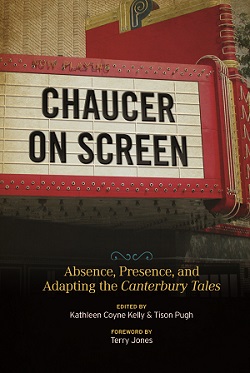Chaucer on ScreenAbsence, Presence, and Adapting the Canterbury TalesEdited by Kathleen Coyne Kelly and Tison Pugh
Interventions: New Studies in Medieval Culture |
 November 14, 2016 296 pp. 6x9  $32.95 paperback 978-0-8142-5372-4 Add paperback to shopping cart $35.95 PDF eBook 978-0-8142-7438-5 Add PDF eBook to shopping cart Shopping Cart Instructions Review/Change Shopping Cart & Check-out | |||
|
“This is a ground-breaking volume. It reflects a continued interest in the intersection of the medieval as a theme, subject matter, and source with more recent technologies and ways of (re)telling narratives.”—Kevin J. Harty, La Salle University “This volume will be highly significant for scholars interested in adaptations of canonical texts, including but not limited to the medieval and Chaucer.” —Helen Young, La Trobe University Unlike William Shakespeare, Jane Austen, Charles Dickens, and other great authors who have enjoyed continued success in Hollywood, Geoffrey Chaucer has largely been shunted to the margins of the cinematic world. Chaucer on Screen: Absence, Presence, and Adapting the Canterbury Tales, edited by Kathleen Coyne Kelly and Tison Pugh, investigates the various translations of Chaucer and the Canterbury Tales to film and television, tracing out how the legacies of the great fourteenth-century English poet have been revisited and reinterpreted through visual media. Contributors to this volume address the question of why Chaucer is so rarely adapted to the screen, and then turn to the occasional, often awkward, attempts to adapt his narratives, including such works as Michael Powell and Emeric Pressburger’s lyrical A Canterbury Tale (1944), Pier Paolo Pasolini’s still-controversial I racconti di Canterbury (1972), Bud Lee’s soft-core The Ribald Tales of Canterbury (1985), Brian Helgeland’s A Knight’s Tale (2001), and BBC television productions, among others. Chaucer on Screen aims to rethink some of the premises of adaptation studies and to erase the ideological lines between textual sources and visual reimaginings in the certainty that many pleasures, scholarly and otherwise, can be found in multiple media across disparate eras. Kathleen Coyne Kelly is Professor of English at Northeastern University. Tison Pugh is Professor of English at the University of Central Florida. | ||||

